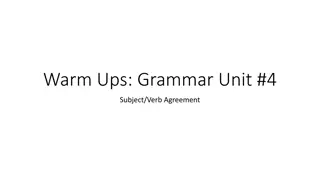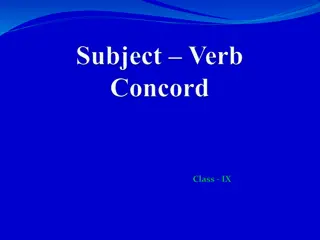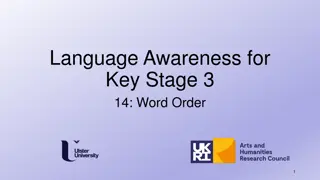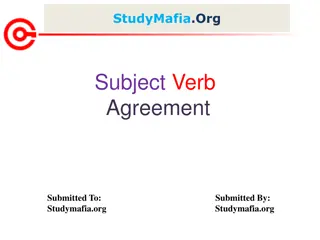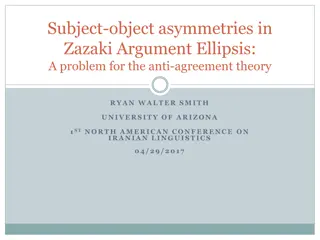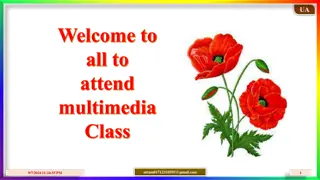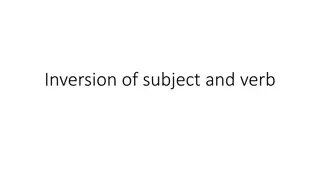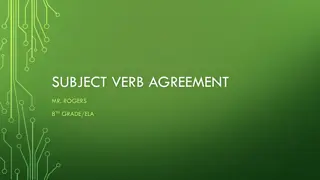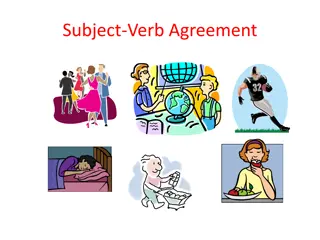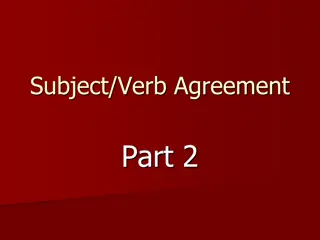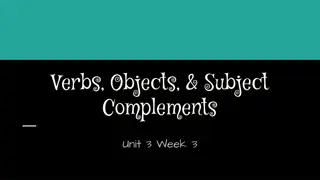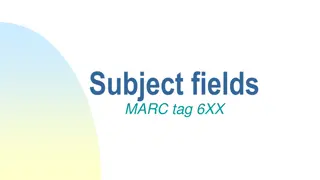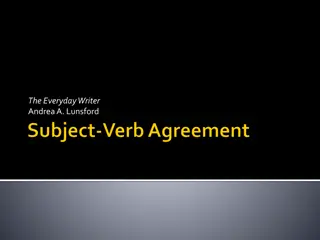Understanding Subject-Verb Agreement in Grammar
Explore the importance of subject-verb agreement in sentences, where a singular subject requires a singular verb and a plural subject needs a plural verb. Learn how to match subjects and verbs correctly to maintain agreement. Discover tips, examples, and resources to enhance your grammar skills effectively.
Download Presentation

Please find below an Image/Link to download the presentation.
The content on the website is provided AS IS for your information and personal use only. It may not be sold, licensed, or shared on other websites without obtaining consent from the author. Download presentation by click this link. If you encounter any issues during the download, it is possible that the publisher has removed the file from their server.
E N D
Presentation Transcript
Subject/Verb Subject/Verb Agreement Agreement
A singular subject needs a singular verb, and a plural subject needs a plural verb. (Reminder: The verb is the action word in the sentence. The subject is who or what does the action.)
Subjects and verbs must work together. They must agree. A verb that ends in a single -s, -es, or -ies is used with a singular noun.
Examples Examples Singular Subject Singular Verb Old Dan bellows Little Ann shares Fire glows Mama fixes
A verb that does not end in a single s, es, or ies is used with a plural noun.
Examples Examples Plural Subject Plural Verb Old Dan and Little Ann bellow The coon hounds share The two fires glow fix Billy s parents
The raccoon [singular subject] jumps [singular verb] into the sycamore tree. The raccoons [plural subject] jump [plural verb] into the sycamore tree. Little Ann [singular subject] is [singular verb] kind. Little Ann and Old Dan [plural subject] are [plural verb] kind.
Brain Pop Brain Pop Watch the Brain Pop movie, then try the quiz. http://www.brainpop.com/english/grammar/ subjectverbagreement/
No big deal? Usually not. Here are a few rules just in case you find yourself confused.
Dont be confused by Don t be confused by plural words that plural words that come after the verb. come after the verb.
Wrong Billy s biggest problem are the many sleepless nights. Right Billy s biggest problem [singular subject] is [singular verb] the many sleepless nights.
Which is correct? Which is correct? a) The hound search for mountain lions. b) The hound searches for mountain lions.
Correct Correct b) The hound searches for mountain lions. hound searches
Which is correct? Which is correct? a) Old Dan see raccoons. b) Old Dan sees raccoons.
Correct Correct b) Old Dan sees raccoons. Old Dan sees
Dont be confused by Don t be confused by plural words that come plural words that come between a singular between a singular subject and the verb. subject and the verb.
Wrong The topic of these books are dogs. Right The topic [singular subject] of these books is [singular verb] dogs.
Wrong Each of the dogs hunt well. Right Each [singular subject] of the dogs hunts [singular verb] well.
Wrong Every one of the members of both hunting teams are here. Right Every one [singular subject] of the members of both hunting teams is [singular verb] here.
Which is correct? Which is correct? a) Each of the traps needs to be set. b) Each of the traps need to be set.
Correct Correct a) Each of the traps needs to be set. Each needs
Which is correct? Which is correct? a) The boy in the brown shoes wants a lollipop. b) The boy in the brown shoes want a lollipop.
Correct Correct a) The boy in the brown shoes wants a lollipop. Boy wants
Dont be confused by Don t be confused by phrases such as along phrases such as along with, together with, with, together with, accompanied by, as well accompanied by, as well as, including and in as, including and in addition to. addition to.
Wrong Little Ann, as well as Old Dan, like to hunt. Right Little Ann [singular subject] , as well as Old Dan, likes [singular verb] to hunt.
Wrong Billy, in addition to all the other boys in the mountains, grow up loving hound dogs. Right Billy [singular subject], in addition to all the other boys in the mountains, grows [singular verb] up loving hound dogs.
Which is correct? Which is correct? a) Papa, as well as Mama, worries about Billy being out all night long. b) Papa, as well as Mama, worry about Billy being out all night long.
Correct Correct a) Papa, as well as Mama, worries about Billy being out all night long. Papa worries
Which is correct? Which is correct? a) Cornbread, in addition to some warm milk, are good for puppies. b) Cornbread, in addition to some warm milk, is good for puppies.
Correct Correct b) Cornbread, in addition to some warm milk, is good for puppies. Cornbread is
Dont be confused by Don t be confused by either/or and neither/nor. either/or and neither/nor.
Neither Billy nor Little Ann knows which way the raccoon ran. (Both parts are singular, so use a singular verb.)
Neither the boys nor the girls know which way the raccoon ran. (Both parts are plural, so use a plural verb.)
Neither the dogs nor Billy knows which way the raccoon ran. (One part is plural and one part is singular. The singular part comes right before the verb, so use a singular verb.)
Neither Billy nor the hounds know which way the raccoon ran. (One part is plural and one part is singular. The plural part comes right before the verb, so use a plural verb.)
Wrong Either Little Ann or Old Dan hunt during the heat of the summer. Right Either Little Ann or Old Dan hunts during the heat of the summer.
Which is correct? Which is correct? a) Neither the boys or their mother sings in the church choir. b) Neither the boys or their mother sing in the church choir.
Correct Correct a) Neither the boys or their mother sings in the church choir. Mother sings
Which is correct? Which is correct? a) Either Grandpa or Billy grind corn at the general store. b) Either Grandpa or Billy grinds corn at the general store.
Correct Correct b) Either Grandpa or Billy grinds corn at the general store. Either (one) grinds
Dont be confused by Don t be confused by noun phrases referring to noun phrases referring to a single unit. a single unit.
Sometimes a noun phrase sounds plural but describes something we think of as a single unit. These noun phrases take a singular verb. Spaghetti and meatballs is [singular] my favorite dinner. Ice cream and cake is [singular] my favorite dessert.
Wrong Peanut butter and jelly are Billy s favorite sandwich. Right Peanut butter and jelly is Billy s favorite sandwich.
Which is correct? Which is correct? a) Macaroni and cheese is a healthy food. b) Macaroni and cheese are a healthy food.
Correct Correct a) Macaroni and cheese is a healthy food.
Dont be confused by Don t be confused by nouns that look plural nouns that look plural but are actually singular. but are actually singular.
The news [singular] of the coon hunt spreads through the town. Mumps [singular] makes one's cheeks hurt and causes swelling and fever. Mathematics [singular] is my best subject in school.
Which is correct? Which is correct? a) Measles is contagious. b) Measles are contagious.
Correct Correct a) Measles is contagious.
Dont be confused by Don t be confused by nouns of amount. nouns of amount.



